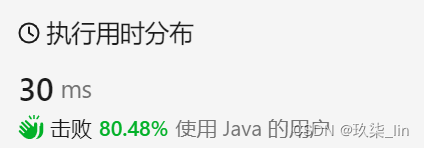15. 三数之和
发布时间:2024年01月21日
给你一个整数数组?nums?,判断是否存在三元组?[nums[i], nums[j], nums[k]]?满足?i != j、i != k?且?j != k?,同时还满足?nums[i] + nums[j] + nums[k] == 0?。请
你返回所有和为?0?且不重复的三元组。
注意:答案中不可以包含重复的三元组。
示例 1:
输入:nums = [-1,0,1,2,-1,-4] 输出:[[-1,-1,2],[-1,0,1]] 解释: nums[0] + nums[1] + nums[2] = (-1) + 0 + 1 = 0 。 nums[1] + nums[2] + nums[4] = 0 + 1 + (-1) = 0 。 nums[0] + nums[3] + nums[4] = (-1) + 2 + (-1) = 0 。 不同的三元组是 [-1,0,1] 和 [-1,-1,2] 。 注意,输出的顺序和三元组的顺序并不重要。
示例 2:
输入:nums = [0,1,1] 输出:[] 解释:唯一可能的三元组和不为 0 。
示例 3:
输入:nums = [0,0,0] 输出:[[0,0,0]] 解释:唯一可能的三元组和为 0 。
提示:
3 <= nums.length <= 3000-105 <= nums[i] <= 105
方法1:(通过311/312)
public static List<List<Integer>> threeSum(int[] nums) {
ArrayList<List<Integer>> result = new ArrayList<>();
Arrays.sort(nums);
for (int i = 0; i < nums.length; i++) {
int left = i;
int right = nums.length - 1;
int mid = left + 1;
while (mid < right){
if (nums[mid] + nums[right] + nums[left] < 0){
mid++;
}else if (nums[mid] + nums[right] + nums[left] > 0){
right--;
}else {
ArrayList<Integer> list = new ArrayList<>();
list.add(nums[left]);
list.add(nums[mid]);
list.add(nums[right]);
mid++;
right--;
if (!result.contains(list)){
result.add(list);
}
}
}
}
return result;
}对以上代码的修改,使得通过所有用例:(38ms)
public static List<List<Integer>> threeSum(int[] nums) {
ArrayList<List<Integer>> result = new ArrayList<>();
Arrays.sort(nums);
for (int i = 0; i < nums.length; i++) {
int left = i;
if (i > 0 && nums[i] == nums[i - 1]){
continue;
}
int right = nums.length - 1;
int mid = left + 1;
while (mid < right){
if (nums[mid] + nums[right] + nums[left] < 0){
mid++;
}else if (nums[mid] + nums[right] + nums[left] > 0){
right--;
}else {
result.add(Arrays.asList(nums[left], nums[mid], nums[right]));
while (mid < right && nums[mid +1] == nums[mid]){
mid++;
}
while (mid < right && nums[right] == nums[right - 1]){
right--;
}
mid++;
right--;
}
}
}
return result;
}?
方法2:

public List<List<Integer>> threeSum(int[] nums) {
//定义一个结果集
List<List<Integer>> res = new ArrayList<>();
//数组的长度
int len = nums.length;
//当前数组的长度为空,或者长度小于3时,直接退出
if(nums == null || len <3){
return res;
}
//将数组进行排序
Arrays.sort(nums);
//遍历数组中的每一个元素
for(int i = 0; i<len;i++){
//如果遍历的起始元素大于0,就直接退出
//原因,此时数组为有序的数组,最小的数都大于0了,三数之和肯定大于0
if(nums[i]>0){
break;
}
//去重,当起始的值等于前一个元素,那么得到的结果将会和前一次相同
if(i > 0 && nums[i] == nums[i-1]) continue;
int l = i +1;
int r = len-1;
//当 l 不等于 r时就继续遍历
while(l<r){
//将三数进行相加
int sum = nums[i] + nums[l] + nums[r];
//如果等于0,将结果对应的索引位置的值加入结果集中
if(sum==0){
// 将三数的结果集加入到结果集中
res.add(Arrays.asList(nums[i], nums[l], nums[r]));
//在将左指针和右指针移动的时候,先对左右指针的值,进行判断
//如果重复,直接跳过。
//去重,因为 i 不变,当此时 l取的数的值与前一个数相同,所以不用在计算,直接跳
while(l < r && nums[l] == nums[l+1]) {
l++;
}
//去重,因为 i不变,当此时 r 取的数的值与前一个相同,所以不用在计算
while(l< r && nums[r] == nums[r-1]){
r--;
}
//将 左指针右移,将右指针左移。
l++;
r--;
//如果结果小于0,将左指针右移
}else if(sum < 0){
l++;
//如果结果大于0,将右指针左移
}else if(sum > 0){
r--;
}
}
}
return res;
}方法3:(9ms)
public List<List<Integer>> threeSum(int[] nums) {
List<List<Integer>> res = new ArrayList<List<Integer>>();
if (nums == null || nums.length < 3) return res;
Arrays.sort(nums);
for (int i = 0; i < nums.length - 2; i++) {
if (i != 0 && nums[i] == nums[i - 1]) continue;
int low = i + 1;
int high = nums.length - 1;
while (low < high) {
int sum = nums[low] + nums[high] + nums[i];
if (sum == 0) {
List<Integer> item = new ArrayList<Integer>();
item.add(nums[i]);
item.add(nums[low]);
item.add(nums[high]);
res.add(item);
low++;
high--;
while (low < high && nums[low] == nums[low - 1]) low++;
while (low < high && nums[high] == nums[high + 1]) high--;
} else if (sum > 0) {
high--;
} else {
low++;
}
}
}
return res;
}
文章来源:https://blog.csdn.net/linping_wong/article/details/135723544
本文来自互联网用户投稿,该文观点仅代表作者本人,不代表本站立场。本站仅提供信息存储空间服务,不拥有所有权,不承担相关法律责任。 如若内容造成侵权/违法违规/事实不符,请联系我的编程经验分享网邮箱:chenni525@qq.com进行投诉反馈,一经查实,立即删除!
本文来自互联网用户投稿,该文观点仅代表作者本人,不代表本站立场。本站仅提供信息存储空间服务,不拥有所有权,不承担相关法律责任。 如若内容造成侵权/违法违规/事实不符,请联系我的编程经验分享网邮箱:chenni525@qq.com进行投诉反馈,一经查实,立即删除!
最新文章
- Python教程
- 深入理解 MySQL 中的 HAVING 关键字和聚合函数
- Qt之QChar编码(1)
- MyBatis入门基础篇
- 用Python脚本实现FFmpeg批量转换
- OpenWrt智能路由器Wan PPPoE拨号配置方法
- Go 重构:尽量避免使用 else、break 和 continue
- 寻找身高相近的小朋友Python实现
- 在用 App 设计工具创建的 App 内共享数据
- Redis面试题5
- Odrive 学习系列四:如何使用脚本自动初始化odrive配置
- Fiddler抓包 -- 使用教程
- Java8内置四大核心函数式接口
- 事务的ACID属性是什么?为什么它们很重要?
- Web自动化之显式等待与隐式等待